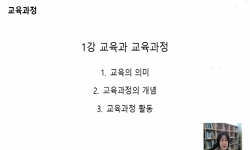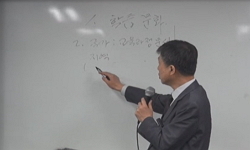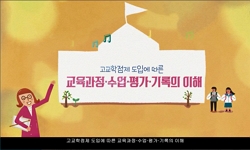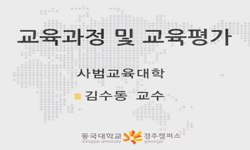The quality management of curricula has focused strictly on determining if and how schools have implemented national or local curricula as specified in curriculum documents. This approach reflects the perspective of quality control or inspection, whic...
http://chineseinput.net/에서 pinyin(병음)방식으로 중국어를 변환할 수 있습니다.
변환된 중국어를 복사하여 사용하시면 됩니다.
- 中文 을 입력하시려면 zhongwen을 입력하시고 space를누르시면됩니다.
- 北京 을 입력하시려면 beijing을 입력하시고 space를 누르시면 됩니다.

교육과정의 질 관리 개념 및 개선 방향 탐색 = Exploring the Meaning of Total Quality Management of Curriculum and Its Implications
한글로보기https://www.riss.kr/link?id=A99863825
- 저자
- 발행기관
- 학술지명
- 권호사항
-
발행연도
2013
-
작성언어
Korean
- 주제어
-
KDC
370.5
-
등재정보
KCI등재
-
자료형태
학술저널
-
수록면
99-121(23쪽)
-
KCI 피인용횟수
7
- 제공처
- 소장기관
- ※ 대학의 dCollection(지식정보 디지털 유통체계)을 통하여 작성된 목록정보입니다.
-
0
상세조회 -
0
다운로드
부가정보
다국어 초록 (Multilingual Abstract)
The quality management of curricula has focused strictly on determining if and how schools have implemented national or local curricula as specified in curriculum documents. This approach reflects the perspective of quality control or inspection, which rarely provides information on how to improve practices and how to achieve academic excellence for all students. Therefore, in this study, the researchers conceptualized the meaning of quality curriculum and developed a model for total quality management of curricula.
Results show that, first, quality curriculum means academic excellence for all students, and total quality management of curricula refers to a continuous effort for improvement. Second, a model was developed to show what total quality management looks like by revealing relationships among quality management elements and curriculum elements with the objective of realizing academic excellence for all. Third, the national curriculum was also evaluated as a part of total quality management. Lastly, the CIPP evaluation model appears to be aligned with this one, but it should be adjusted to reflect the cultural component.
국문 초록 (Abstract)
우리나라에서 교육과정의 질 관리는 주로 국가 또는 지역 교육과정의 편성・운영 지침을 학교가 지키는가에 중점을 두는 방식으로 이루어져 왔다. 이는 질 관리의 초기개념인 검사(inspection)...
우리나라에서 교육과정의 질 관리는 주로 국가 또는 지역 교육과정의 편성・운영 지침을 학교가 지키는가에 중점을 두는 방식으로 이루어져 왔다. 이는 질 관리의 초기개념인 검사(inspection) 혹은 질 통제에 가까우며 어떻게 개선하여야 모든 학생의 학습의 수월성을 성취할 것인가에 대한 정보를 거의 제공하지 않는다. 이에 이 연구에서는 교육 부문에서 질과 질 관리를 연구해 온 Sallis의 이론에 비추어 교육과정 질과 교육과정의 질 관리의 의미를 개념화하였다. 그리고 교육과정의 질 관리를 위해 필요한 요소들을 찾고 이들 간의 관계를 보여주는 교육과정의 질 관리 모형을 제안하였다.
구체적인 연구 결과는 다음과 같다. 첫째, 교육과정의 질은 모든 학생의 학습의 수월성을 의미하며, 질 관리란 교육과정의 질을 강조하고 지속적으로 교육과정을 개선하는 것이라는 결론을 내렸다. 둘째, 이러한 개념에 비추어 학생의 학습의 수월성 성취를 중심에 두고 관련된 교육과정 요소와 교육과정의 질 관리 요소의 관계를 보여주는 교육과정의 질 관리 모형을 제시하였다. 셋째, 국가 교육과정 또한 질 관리 모형에서 제시하는 요소들에 대한 지속적 개선이 필요한 질 관리 대상이라는 점을 밝혔다. 마지막으로, 교육과정의 질 관리를 위한 개선 정보를 지속적으로 확인할 수 있는 관리지향의 CIPP 평가모형의 활용을 제안하였다.
목차 (Table of Contents)
- Ⅰ. 서론
- II. Sallis의 ‘질’과 ‘질 관리’ 개념
- 1. ‘질’ 개념
- 2. 질 관리 개념
- Ⅲ. 교육과정의 질 관리 개념과 모형 제안
- Ⅰ. 서론
- II. Sallis의 ‘질’과 ‘질 관리’ 개념
- 1. ‘질’ 개념
- 2. 질 관리 개념
- Ⅲ. 교육과정의 질 관리 개념과 모형 제안
- 1. 교육과정의 질 관리 개념
- 2. 교육과정의 질 관리 모형
- Ⅳ. 질 관리 도구로써 교육과정 평가
- V. 결론 및 논의
- 참고문헌
- Abstract
참고문헌 (Reference)
1 Tomlinson, C. A.., "맞춤형 수업과 이해중심 교육과정의 통합" 학지사 2012
2 황규호, "국가수준 교육과정 질 관리를 위한 평가 준거 개발 연구" 교육과학기술부 2012
3 Wiggins, G., "Understanding by Design" Association for Supervision and Curriculum Development 1998
4 Wiggins, G., "Understanding by Design" Association for Supervision and Curriculum Development 2005
5 Sallis, E., "Total management in education" Stylus Publishing Inc 2002
6 Stufflebeam, D. L., "The relevance of the CIPP evaluation model for educational accountability" 5 : 19-25, 1971
7 Fullan, M., "The new meaning of educational change" Teachers College Press 2001
8 Wiske, M. S., "Teaching for understanding: Linking research with practice" Jossey-Bass 1998
9 Stufflebeam, D. L., "Systematic evaluation" Kluwer-Nijhoff 1985
10 Bonstingl, J. J., "Schools of quality: An introduction to total quality management in education" ASCD 1992
1 Tomlinson, C. A.., "맞춤형 수업과 이해중심 교육과정의 통합" 학지사 2012
2 황규호, "국가수준 교육과정 질 관리를 위한 평가 준거 개발 연구" 교육과학기술부 2012
3 Wiggins, G., "Understanding by Design" Association for Supervision and Curriculum Development 1998
4 Wiggins, G., "Understanding by Design" Association for Supervision and Curriculum Development 2005
5 Sallis, E., "Total management in education" Stylus Publishing Inc 2002
6 Stufflebeam, D. L., "The relevance of the CIPP evaluation model for educational accountability" 5 : 19-25, 1971
7 Fullan, M., "The new meaning of educational change" Teachers College Press 2001
8 Wiske, M. S., "Teaching for understanding: Linking research with practice" Jossey-Bass 1998
9 Stufflebeam, D. L., "Systematic evaluation" Kluwer-Nijhoff 1985
10 Bonstingl, J. J., "Schools of quality: An introduction to total quality management in education" ASCD 1992
11 Stufflebeam, D. L., "Lessons in contracting for evaluations" 21 : 293-314, 2000
12 Wineburg, S., "Interdisciplinary curriculum: Challenges to implementation" Teachers College Press 2000
13 Glatthorn, A., "Developing a quality curriculum"
14 Glatthorn, A., "Curriculum leadership: Strategies for development and implementation" SAGE 2009
15 Drake, S. M., "Creating standards-based integrated curriculum: The common core state standards Edition" Corwin Press 2012
16 Drake, S. M., "Creating standards-based integrated curriculum: Aligning curriculum, content, assessment, and instruction" Corwin Press 2007
17 Spady, W. G., "Beyond traditional outcome-based education" 48 (48): 67-72, 1991
18 Stufflebeam, D. L., "An introduction to the PDK book: Education evaluation and decision-making, In Educational evaluation: Theory and practice" Wadsworth 1973
동일학술지(권/호) 다른 논문
-
- 이화여자대학교 교육과학연구소
- 백일우
- 2013
- KCI등재
-
그림책 함께 보기에서 활용하는 매체에 따른 만 2세반 영아의 언어발달, 주의집중도, 그림책에 대한 태도 비교
- 이화여자대학교 교육과학연구소
- 권연정
- 2013
- KCI등재
-
학교폭력 대책 강화에 따른 단위학교 사안 처리과정에서의 갈등 분석
- 이화여자대학교 교육과학연구소
- 한유경
- 2013
- KCI등재
-
대학 이러닝 수업에서 조절초점 성향에 따른 만족도와 학습지속의향 예측력과 자기효능감의 매개효과 검증
- 이화여자대학교 교육과학연구소
- 송윤희
- 2013
- KCI등재
분석정보
인용정보 인용지수 설명보기
학술지 이력
| 연월일 | 이력구분 | 이력상세 | 등재구분 |
|---|---|---|---|
| 2026 | 평가예정 | 재인증평가 신청대상 (재인증) | |
| 2020-01-01 | 평가 | 등재학술지 유지 (재인증) |  |
| 2017-01-01 | 평가 | 등재학술지 유지 (계속평가) |  |
| 2013-01-01 | 평가 | 등재학술지 유지 (등재유지) |  |
| 2010-01-01 | 평가 | 등재학술지 유지 (등재유지) |  |
| 2007-01-01 | 평가 | 등재학술지 선정 (등재후보2차) |  |
| 2006-01-01 | 평가 | 등재후보 1차 PASS (등재후보1차) |  |
| 2004-01-01 | 평가 | 등재후보학술지 선정 (신규평가) |  |
학술지 인용정보
| 기준연도 | WOS-KCI 통합IF(2년) | KCIF(2년) | KCIF(3년) |
|---|---|---|---|
| 2016 | 1.54 | 1.54 | 2.09 |
| KCIF(4년) | KCIF(5년) | 중심성지수(3년) | 즉시성지수 |
| 2.19 | 2.24 | 2.372 | 0.28 |




 RISS
RISS DBpia
DBpia







